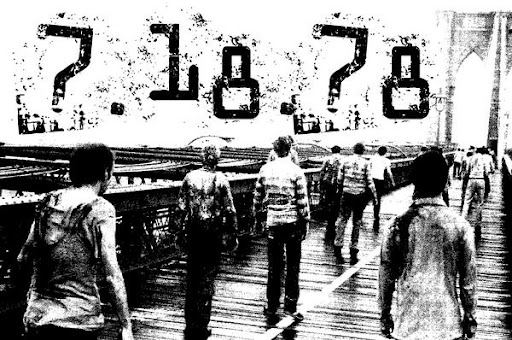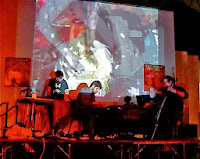Subtlety is not a common virtue among many sound, and performance, artists these days. Making use of droning and/or ambient sound can add dynamics, but it isn't necessarily a use of subtlety.
Gerritt Wittmer's recorded output, and performances, are a perfect example of how subtlety can make a shudderingly peaked sound more powerful, as well as creating a dynamic tension and vibe through silence, and minimal use of sound, that soaks into your bones like a cold, damp Winter day. This is not hyperbole. This is truth.
I read a description of your new solo album, Making Real, that states: "Making Real, an exercise in creating reality." Another quote from you: "The first step in understanding what's real is accepting that nothing is." What IS real?
Unfortunately I can not answer that for you, only you can.
The artwork for Making Real, and Portions of Hell, is fascinating in that it seems to conceal as much as it reveals. Do you mind going into some of the thought behind the artwork of these two releases?
The artwork for both of those is an extension of each record. Both are a story that require contemplation. Neither is well suited for casual listening. Listening to those records is like reading a book, and the printed art is another piece to the puzzle.
How did you get started into experimenting with sound? Did you start out playing in bands beforehand?
Yes, played in bands when I was younger, punk etc…Went to school for audio engineering, began experimenting, found others etc...
It seems like a lot of sound artists I've talked to started out in rock-based music. Why do you think this is? Why didn't you just stick with music?
Well, that was so long ago for me, I remember it being very appealing to be able to work by myself, and I just fell in love with the sound. It seemed more pure for me, much more like art that one could
 |
| Gerritt Wittmer and Paul Knowles |
Your earlier work, in my opinion, dealt with harsher layers of sound. Whereas, Portions of Hell, Heartbeat, Making Real, and some of your collaboration albums show a considerable amount of restraint. One thing that sticks out to me through your albums, and, also, the artists you release through Misanthropic Agenda, is the amount of texture in the sounds. Mood and texture is always present. Is this true? And, what types of sounds do you personally enjoy?
Yes, of course mood and texture mean a lot. My work has changed focus drastically. Pretty much the "Gerritt" material is mostly maximal harsh. I have since developed a new understanding and excitement for performance which also extends to my current recorded material. With my current solo material I don't approach anything casually. I agonize over thoughts and details, everything is highly composed. I personally like production, timing and flow. When it comes to sound.
If were talking music, traditional song stuff, I'm pretty far out there. I listen to a wide gamut of music from various time periods. I'm really opinionated on what I like, and I think everything I enjoy has this same unsaid quality to it, that could bind it all together, of course in a mad mans mind.
When I started exploring performance art with my own work, I definitely had an outsiders perspective. It just seemed natural for me, what I was doing and how it flowed with my concepts and ideals. If any inspiration was there it was more from film then other performance artist.
I have always wanted to be a director and make films. But for whatever reasons never did. I think my performances are my films. I create scenes, and narratives, and the records are extension of this too. I am making films that are captured in memories of minds rather than physically on film. Im not good at the list thing, I will say I have been inspired by some of David Lynch's work.
So, you enjoy being able to work alone without limitations. How does the duo of Names, and your collaborations with Paul Knowles play into this independence?
Well, working with Jesse (Names) or Paul (GW&PK) has been great. Both are great friends that I am lucky to have and I fill privileged to have been able to cultivate such valuable working relationships with them. They are great examples of people that I can not only work with, but fully collaborate with
on the highest levels and really come up with something unique, well outside of the realms of what I would do If I was working alone. Its good to work alone, but when you find the right people, a special kind of magic can happen and the rewards of this are certainly worth the risks.
You mentioned Jesse Jackson's background, but I don't know anything about Paul. How'd you guys start working together?
Paul Knowles and I have been friends for years. We meet at our job and share many common interests. I had seen Paul perform onstage in various theater productions and was always impressed. He is a naturally gifted artist whose work runs a wide array. From acting and comedy to ceramics, screen printing, and painting.
The GW & PK project just sort of organically came to birth from Paul and I hanging out, and discussing ideas about metaphysics and sound and performance. I think we are both good at helping each other cultivate one another's ideas and bring them to fruition. The work I have done with Paul has been some of my most rewarding. We have been discussing and planning getting back together again to work on new performances, hopefully in 2014.
Most of your albums are self-released through your imprint, Misanthropic Agenda. Was this due to the labels namesake (a hatred/dislike of humankind and society), or something else?
Most are self released because I want my releases to be of high quality, and most of the time its just easier doing it yourself. I don't like getting caught up in business. I am no commodity, so its best I try not to be something I'm not with other peoples time and money.
In a scene so obsessed with cassette culture, you stand out with your preference for CD format over tapes. Why do you prefer CD to tape?
Honestly, CD sounds so much better than all the tapes I hear. Don't get me wrong, I love analog, and have a ridiculous amount of records. I love vinyl. and I understand why cassette is so appealing, you can make them at home etc… But sound wise, with very few exceptions they almost always fall short for me. Possibly if we lived a world where people could dupe 3 inch tape at home, I would probably enjoy that.
I'm very excited about Names. Its my first real return to music and song writing in more than a decade. Names is a duo, myself and Jesse Jackson. I have know Jesse for years, he has been in lots a great bands. (Flaspar, Liars (live guitar), and Sissy Spacek) We are close friends and can work really well
 |
| Names |
Names is about us, how we feel about most current music (bored to death). We don't care if people like us, we don't follow rules, we don't subscribe to a genre or style. None of that is for us. We are hoping to finish our first full length soon, and have a remix record of our first single LMAB almost finished. Currently looking for interested open minded labels, ahem.
What releases do you have in the works for next year of your work, and through Misanthropic Agenda?
Lets see, Names will be releasing a book/dvd/CD set called Weak in Vegas, documenting the 7 nights of shows we played in Las Vegas in October. The Names full length and LMAB remixes single should come out as well. December 31st is the release date for a 2 disc set from Seers, my project with Pete Swanson. There will be a release from my live and studio collaboration with Francisco Meirino and Romain Perrot. A highly anticipated full length CD from Francisco Meirino. And, maybe another solo release from myself? Plus a few other things that may or may not happen.
http://www.gerrittwittmer.com










